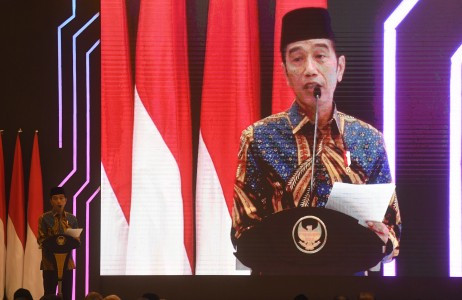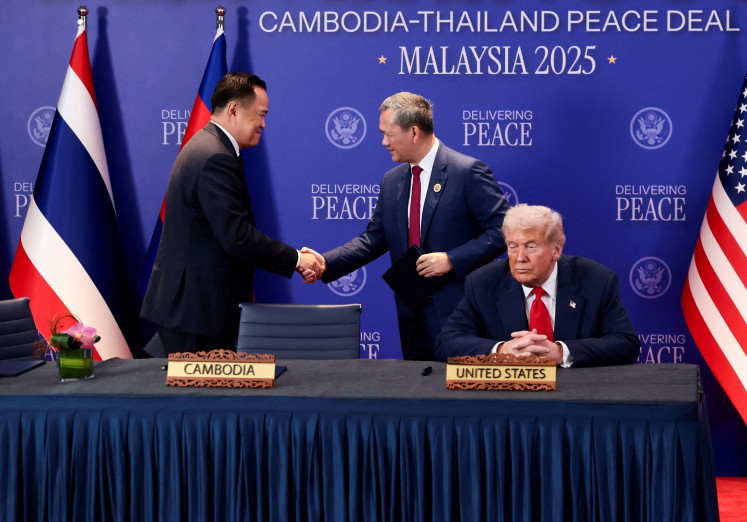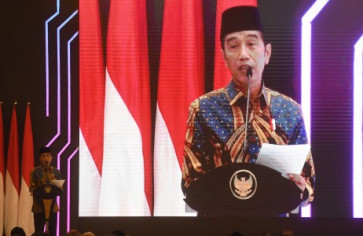Popular Reads
Top Results
Can't find what you're looking for?
View all search resultsPopular Reads
Top Results
Can't find what you're looking for?
View all search resultsGame-changing reforms should be back in play
The good news is that critical structural economic reforms, which are far more consequential to Indonesia’s investment climate and long-term growth potential, are likely back in play. Since the election, the soundbytes from President Joko “Jokowi” Widodo are encouraging. Although these statements are usually met with skepticism, this time may be different, for two reasons.
Change text size
Gift Premium Articles
to Anyone
Financial markets this year have been very focused on monetary and fiscal policy responses to external developments.
Counter-cyclical policies undoubtedly have critical roles to play in Indonesia to support sustainable growth and price stability, especially in the current uncertain environment. By navigating and balancing elevated external risks against domestic considerations, policymakers have gained credibility, which investors have rightfully acknowledged. Standard & Poors upgraded Indonesia’s sovereign credit rating by one-notch to BBB in May, citing in part supportive policy dynamics.
The Finance Ministry has opted to keep the fiscal deficit initially at 1.8 percent of gross domestic product (GDP) this year (unchanged from last year), despite the elections in April, arguing that it doesn’t want to add to the political uncertainty by running a highly expansionary fiscal stance that could result in increased borrowing and spook bond investors. The ministry did recently decide to expand the 2019 deficit to 1.9 percent, but this is still nowhere near the 3 percent legal limit. Markets have acknowledged Bank Indonesia’s (BI) prudence for exercising patience, as it only started cutting its policy rate in July while most other regional central banks began much earlier; this is a reflection of BI’s decision to prioritize financial market stability, particularly in the currency, after last year’s challenges.
However, we could be approaching some limits and policy-related risks. Citing growth concerns, BI has reduced its policy rate three straight times to 5.25 percent, bringing the total cuts to 75 basis points and overtaking some of the central banks that started easing earlier. This may run the risk of inadvertently adding to currency pressures if external risks escalate again, reminiscent of the back to back cuts in late 2017.
Also, given the lagged impact of monetary policy and sticky transmission mechanisms, fiscal policy would be more effective in boosting growth in the short run, particularly as the current environment necessitates that BI keep its foreign exchange stability objective a top priority. However, the 2020 budget proposed to the House of Representatives by the Finance Ministry envisaged a lower fiscal deficit of 1.76 percent of GDP, which means less fiscal support to economic growth next year, despite the government having plenty of fiscal space. Even other countries with much less wiggle room are already taking more accommodative fiscal action: India, for example, is implementing corporate tax cuts, while Malaysia has been hinting at a slower pace of fiscal consolidation next year to avoid exacerbating an export-led slowdown.
The good news is that critical structural economic reforms, which are far more consequential to Indonesia’s investment climate and long-term growth potential, are likely back in play. Since the election, the soundbytes from President Joko “Jokowi” Widodo are encouraging. Although these statements are usually met with skepticism, this time may be different, for two reasons.
First, President Jokowi is taking a “nothing to lose” mentality to make more in-roads on reforms. This is not only indicative of his stronger political will, but also provides a sense of prioritization, given the limited timeframe, to build on the foundations of his first term. Reforms to improve the ease of doing business, as well as physical capital accumulation via higher infrastructure spending, are set to remain high on the agenda. What is new is the high priority placed on human capital development as part of an effort to boost overall productivity growth.


















